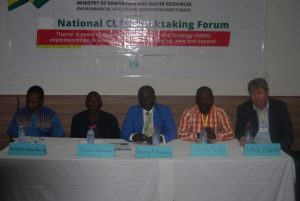
Ghana’s Minister for Sanitation and Water Resources (MSWR), Joseph Kofi Adda has urged all WASH sector players to adhere to the National Guidelines in the implementation of their Community Led Total Sanitation (CLTS) programmes rather than the project-specific guidelines currently being used by some organisations.
This, he noted would ensure consistency in the approach to sanitation services delivery in the rural areas, as enshrined in the Rural Sanitation Model and Strategy (RSMS)
Mr. Adda, whose speech was read on his behalf by the Director of Policy Planning, Budgeting, Monitoring and Evaluation (PPBME), Patrick A. Asumadu, at the Fifth National Basic Sanitation Forum in Kumasi, in the Ashanti Region of Ghana, said the Ministry was not unaware of the implementation challenges faced by stakeholders, but advised against using those challenges as justifications for side-step the Water Sanitation and Health (WASH) sector CLTS implementation guidelines.
While encouraging a strong collaboration between the Environmental Health and Sanitation Directorate (EHSD) of the Ministry of Sanitation and Water Resources and sector players, the Sanitation and Water Resources Minister also appealed to WASH sector actors to kindly streamline their implementation activities in line with the national guidelines and tools for CLTS implementation developed by the sector.
Mr. Adda said the Ministry was aware that access to improved sanitation was significantly lower in Ghana as compared to other essential services, a development he described as a sad reality.
According to the Sanitation and Water Resources Minister, Ghana’s improved sanitation coverage was only 15%, having increased by only 7% since 1990. Explaining further, Mr. Adda said nearly 1 out of 4 households (22.9%) practice open defecation (OD) or have no toilet facility, with significant inequity evident between the rich (1%) and the poor (67% in the poorest quintile)
Aside the low access to improved sanitation by the citizenry, the Minister said the practice of hand washing with soap was also low in Ghana with only about 24% of households having hand washing facilities, and only half of the facilities having soap and water on location.
The uncontrolled disposal of faecal sludge, poor sanitation and hygiene practices, Mr. Kofi Adda explained are the major causes and contributors to the outbreak of the many water and sanitation related diseases including cholera which records indicated kills 7,500 children annually in Ghana through diarrhea.
To stem the low tide of access to improved sanitation services in Ghana, the Minister for Sanitation and Water Resources, explained that the Government of Ghanadeveloped and was implementing a number of policies and strategies to address some of the teething sanitation challenges that confronted the country.
Key among the policies and strategies the Ministry has developed and implementing include: the National Environmental Sanitation Strategy and Action Plan (NESSAP), District/Municipal/Metropolitan Environmental Sanitation Strategy and Action Plan (DESSAP/MESSAP), Strategic Environmental Sanitation Investment Plan (SIP), Rural Sanitation Model and Strategy(RSMS) and the House Water Treatment and Safe Storage(HWTS) and the Verification and Certification Protocol.
These policies and strategies according to the Minister provided the framework for tackling the sanitation and hygiene and behaviour change issues that confronted the country as well as ensure that Ghana achieved the national open defecation free (ODF) status by the year 2020.
Ghana’s Rural Sanitation Model and Strategy (RSMS) strategy was developed with aim of eliminating the practice of open defecation and promote the use of improved latrines. Currently, the approach is being implemented by various organisations in 130 districts in all the 10 Regions.
The Minister for Sanitation and Water Resources pledged to work assiduously to ensure that the vision of the new Ministry to ensure sustainable water and environmental sanitation for all was achieved, adding that the Ministry’s resolve to ensure that all people living in Ghana should have access to adequate, safe, affordable and reliable water supply services, practiced safe sanitation and hygiene and that water resources are sustainably managed would not be shirked.
Mr. Kofi Adda was optimistic of the Ministry’s continuous commitment to formulating policies, plans and programmes to manage in a sustainable manner the nation’s water resources, provide safe, adequate and affordable water services; provide sanitation facilities, effective and sustainable management of liquid and solid waste for the well-being of all people living in the country.
The 2017 National Basic Sanitation Forum was under the theme: “Five years of Rural Sanitation Model and Strategy (RSMS) implementation in Ghana, learning for scaling up, Now and Beyond.”
African Eye Report



